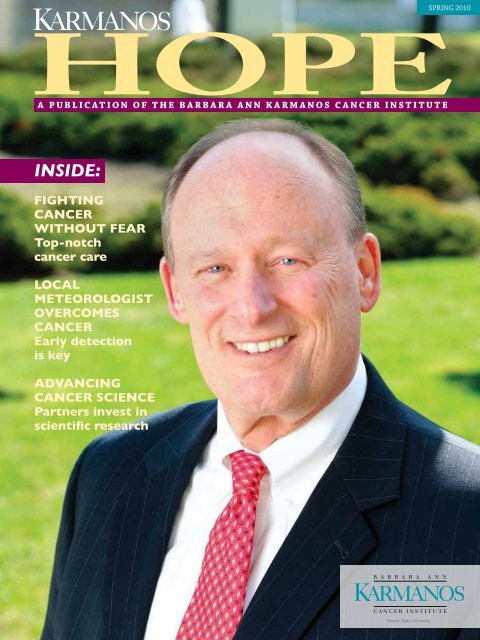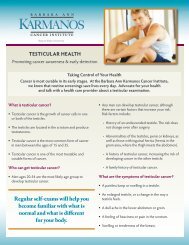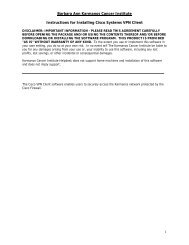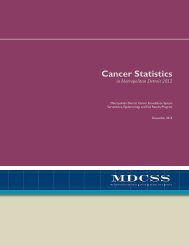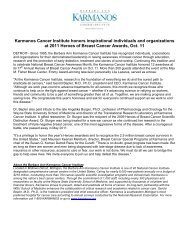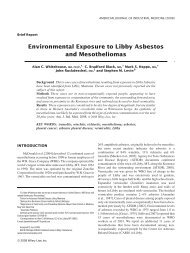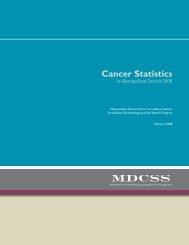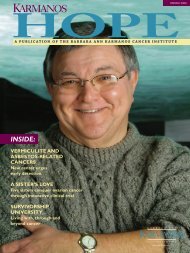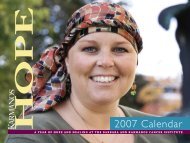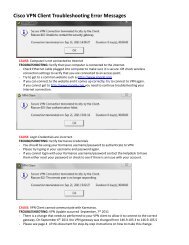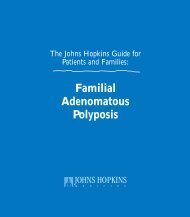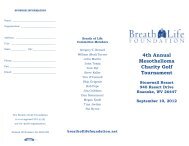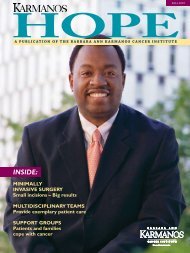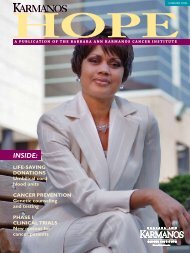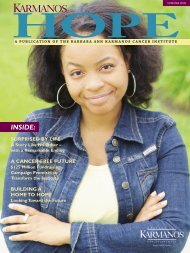Spring 2010 - Karmanos Cancer Institute
Spring 2010 - Karmanos Cancer Institute
Spring 2010 - Karmanos Cancer Institute
You also want an ePaper? Increase the reach of your titles
YUMPU automatically turns print PDFs into web optimized ePapers that Google loves.
HOPE<strong>Spring</strong> <strong>2010</strong><br />
A P U B L I C A T I O N O F T H E B A R B A R A A N N K A R M A N O S C A N C E R I N S T I T U T E<br />
INSIDE:<br />
FIGHTING<br />
CANCER<br />
WITHOUT FEAR<br />
Top-notch<br />
cancer care<br />
LOCAL<br />
METEOROLOGIST<br />
OVERCOMES<br />
CANCER<br />
Early detection<br />
is key<br />
ADVANCING<br />
CANCER SCIENCE<br />
Partners invest in<br />
scientific research
PRESIDENT’S LETTER<br />
Dear Friends,<br />
I am extremely honored to serve as the president and chief executive officer<br />
of the Barbara Ann <strong>Karmanos</strong> <strong>Cancer</strong> <strong>Institute</strong>.<br />
Since joining <strong>Karmanos</strong> Feb. 1, I have personally seen how the institution<br />
lives up to its reputation for world-class cancer care and cutting-edge<br />
scientific research. Oncologists and other medical professionals have long<br />
been aware of scientific advancements made here, such as the development<br />
of new cancer-fighting drugs that have gone on to receive FDA approval<br />
by the U.S. government. This translates into having advanced treatment<br />
options and therapies for our patients.<br />
I came to <strong>Karmanos</strong> because I want to lead and be associated with an<br />
institution that will make a significant impact on cancer. Judging from<br />
what I’ve seen so far, I know I am in the right place.<br />
Gerold Bepler, M.D., Ph.D<br />
President & Chief Executive Officer<br />
John C. Ruckdeschel, M.D.<br />
ON THE COVER<br />
PRESIDENT AND CHIEF EXECUTIVE OFFICER When David Lepper was diagnosed with an<br />
BARBARA ANN KARMANOS CANCER INSTITUTE aggressive cancer that affects the head and<br />
neck area, he knew he wanted to be treated<br />
at the <strong>Karmanos</strong> <strong>Cancer</strong> Center. Following<br />
surgery, radiation and chemotherapy, he has<br />
been cancer-free for six years.<br />
(Read more on pages 4–5)<br />
Cover image by Stephen Lengnick, Plum Street Studio<br />
...................................................<br />
SPRING <strong>2010</strong><br />
VOLUME 6 | NUMBER 1<br />
...................................................<br />
ABOUT <strong>Karmanos</strong><br />
The Barbara Ann <strong>Karmanos</strong> <strong>Cancer</strong> <strong>Institute</strong><br />
is one of only 40 National <strong>Cancer</strong><br />
<strong>Institute</strong>-designated comprehensive cancer<br />
centers in the United States. Federal designation<br />
as a comprehensive cancer center is the<br />
pinnacle of translational oncology research.<br />
...................................................<br />
EXECUTIVE STAFF<br />
Gerold bepler, m.d., Ph.D.<br />
President and Chief Executive Officer<br />
Ann G. Schwartz, Ph.D., MPH<br />
Executive Vice President/Deputy Director<br />
George Yoo, m.d., facs<br />
Chief Medical Officer<br />
GARY MORRISON<br />
Chief Operating Officer<br />
Cynthia K. Sikina<br />
Senior Vice President/Chief Financial Officer<br />
Nick <strong>Karmanos</strong><br />
Vice President, Development<br />
...................................................<br />
<strong>Karmanos</strong> <strong>Cancer</strong> <strong>Institute</strong><br />
Board of Directors<br />
Alan S. Schwartz, Chair<br />
Randolph J. Agley, Vice Chair<br />
Charles E. Becker, Lead Vice Chair<br />
Richard M. Gabrys, Vice Chair<br />
W. James Prowse, Vice Chair<br />
Jonathan S. Aaron<br />
Eugene Applebaum<br />
Gerold Bepler, M.D., Ph.D. (ex officio)<br />
Paul Borman<br />
Armando R. Cavazos<br />
Stephen D’Arcy (ex officio)<br />
Debbie Dingell<br />
Joseph Dresner<br />
David W. Drews<br />
Michael E. Duggan<br />
Lillian Erdeljan<br />
Michael Ferrantino, Jr.<br />
Nathan Forbes<br />
Stanley Frankel<br />
Myron Frasier<br />
Bruce A. Gershenson<br />
Adnan Hammad, Ph.D.<br />
Patricia Hartmann<br />
David Jacob<br />
Charles E. Becker, Chair<br />
Timothy Monahan, Vice Chair<br />
Gerold Bepler, M.D., Ph.D. (ex officio)<br />
Leslie C. Bowman<br />
Armando R. Cavazos<br />
Kenneth Eisenberg<br />
Myron Frasier<br />
Thomas A. Goss<br />
S. Scott Hunter<br />
Denise Ilitch<br />
(as of 4/15/10)<br />
Eleanor M. Josaitis<br />
Peter <strong>Karmanos</strong>, Jr.<br />
C. Michael Kojaian<br />
Edward C. Levy, Jr.<br />
Mary Matuja<br />
Timothy Monahan<br />
Paul L. Nine<br />
Jay Noren, M.D., MPH (ex officio)<br />
Thomas D. Ogden<br />
Fred D. Olson<br />
Valerie M. Parisi, M.D. (ex officio)<br />
Hilary Ratner, Ph.D.<br />
Eunice Ring<br />
Richard F. Roth<br />
Gary Sakwa<br />
Nazli G. Sater<br />
Marc R. Schechter<br />
Nettie H. Seabrooks<br />
Nedda N. Shayota<br />
Robert A. Stone<br />
David Trott<br />
Vainutis K. Vaitkevicius, M.D.<br />
Nancy Yaw<br />
<strong>Karmanos</strong> <strong>Cancer</strong> Center<br />
Board of Directors<br />
Valerie M. Parisi, M.D. (ex officio)<br />
W. James Prowse<br />
Anthony J. Rusciano<br />
Alan S. Schwartz (ex officio)<br />
Nettie H. Seabrooks<br />
Maureen L. Stapleton<br />
Jane R. Thomas, Ph.D.<br />
Manuel Valdivieso, M.D.<br />
Antoinette J. Wozniak, M.D. (ex officio)<br />
George Yoo, M.D. (ex officio)
06<br />
CONTENTS<br />
2 FEATURES<br />
A NEW WAY FORWARD<br />
New president & CEO poised to take<br />
<strong>Karmanos</strong> to next level<br />
10<br />
FIGHTING CANCER WITHOUT FEAR<br />
“The doctors at <strong>Karmanos</strong> are amazing.”<br />
– <strong>Cancer</strong> survivor David Lepper<br />
THE IMPORTANCE OF EARLY DETECTION<br />
WDIV Local 4 meteorologist shares his success story<br />
8 COMPASSIONATE CARE<br />
GETTING THE RIGHT DIAGNOSIS<br />
Identifying environmentally caused cancers<br />
12<br />
DRIVING FORCE<br />
Pancreatic cancer survivor forms<br />
Sky Foundation to further research and awareness<br />
12 AT KARMANOS<br />
A PARTY IN PINK<br />
<strong>Karmanos</strong> presents Komen Detroit Race for the Cure®<br />
UP CLOSE<br />
Connie Claybaker, B.A., MBA<br />
Vice President of Research Administration<br />
WE ALL START SOMEWHERE<br />
Medical staff talks about first jobs<br />
18<br />
ADVANCING CANCER SCIENCE<br />
The Partners – a dedicated group of volunteers raising funds<br />
20 AROUND TOWN<br />
21 Kroger’s Acts of Kindness<br />
A tremendous force in the fight against cancer
HOPE | FEATURE<br />
A New Way<br />
On Feb. 1, the <strong>Karmanos</strong> <strong>Cancer</strong> <strong>Institute</strong> entered<br />
a new era as it introduced Gerold Bepler, M.D., Ph.D.,<br />
as its new president and chief executive officer. Dr. Bepler<br />
is a noted thoracic oncologist who was previously director<br />
of the Comprehensive Lung <strong>Cancer</strong> Center at the Moffitt<br />
<strong>Cancer</strong> Center in Tampa, Fla.<br />
Dr. Bepler spoke with HOPE about his vision for<br />
<strong>Karmanos</strong> and the future of cancer care. He also offered a<br />
glimpse of his personal life and how he entered medicine.<br />
Q: What attracted you to the position? Why did you want<br />
to lead <strong>Karmanos</strong>?<br />
A: My goal has always been to lead an institution that is<br />
solely focused on cancer care. But I didn’t want it to be<br />
just anywhere – I wanted to go to a place that can make<br />
a significant impact on cancer. <strong>Karmanos</strong> is one of those<br />
places. It offers solid clinical care, it has all the elements<br />
to discover new cancer therapies and it has the tools to<br />
translate those therapies directly to patient care.<br />
Q: What are your top priorities as<br />
the new President and CEO?<br />
A: First, to develop the next generation<br />
of cancer treatments.<br />
Second, given the uniqueness<br />
of our patient demographics,<br />
reduce cancer disparities. Third,<br />
facilitate access to top of the<br />
line cancer care, for example, by<br />
bringing the latest advances in<br />
cancer care closer to home<br />
for suburban patients at our<br />
treatment center in Farmington<br />
Hills, the <strong>Karmanos</strong>-Crittenton<br />
<strong>Cancer</strong> Center in Rochester<br />
Hills, and the Huron Valley-<br />
Sinai Hospital Charach<br />
<strong>Cancer</strong> Treatment Center in<br />
Commerce. Construction begins<br />
2 | HOPE<br />
Forward<br />
New President and CEO is Poised to Take <strong>Karmanos</strong> to the Next Level<br />
GEROLD BEPLER, M.D., Ph.D.<br />
Title:<br />
President and Chief Executive Officer<br />
Age: 53<br />
Birthplace: Giessen, Germany<br />
Education:<br />
M.D., Ph.D., Philipps University School of<br />
Medicine and Dentistry, Marburg, Germany.<br />
Postdoctoral fellowships completed at the<br />
National <strong>Cancer</strong> <strong>Institute</strong>, Philipps University<br />
and the Duke University Medical Center.<br />
Current residence:<br />
Bloomfield Township<br />
Family:<br />
Wife, Tracey; children Tristan, 18,<br />
Breiton, 12, Isabelle, 9, and Christian, 6.<br />
Hobbies:<br />
Family activities, do-it-yourself home<br />
repairs and projects.<br />
Favorite composers and musicians:<br />
Beethoven, J.S. Bach, Schubert, the Red Hot<br />
Chili Peppers, Queen, Phil Collins, Sting,<br />
and Sarah Brightman.<br />
soon for another cancer center in Monroe. We want to<br />
leverage these outreach initiatives to bring the next generation<br />
of cancer care to patients across the region.<br />
Q: Can you describe your current research efforts?<br />
A: I’m focused on discovering and validating molecules<br />
useful for therapeutic decision making in patients, which<br />
is often called personalized medicine. An increasing<br />
amount of information is available about the molecular<br />
profile of tumors and we have better tools to analyze<br />
those tumors. Together, these components will ultimately<br />
lead to better up-front selection of cancer treatments<br />
for each patient; i.e., to avoid potential toxicity from<br />
less effective treatment and to achieve maximum effect<br />
of available therapies.<br />
Q: How will <strong>Karmanos</strong> elevate its care to the next level?<br />
A: We’ll place a priority on building team science –<br />
bringing scientists with different areas of expertise<br />
together for group research projects. This follows the<br />
same concept as our multidisciplinary<br />
team approach to cancer<br />
treatment, only from a research<br />
perspective. We will apply for<br />
team science grants, such as<br />
the National <strong>Cancer</strong> <strong>Institute</strong>sponsored<br />
SPORE (Specialized<br />
Program of Research Excellence)<br />
grants, which are intended to<br />
support a strong collaboration<br />
between scientists and clinicians.<br />
These collaborations will foster<br />
research that can be translated<br />
into improved cancer diagnosis<br />
and treatment.<br />
Q: In your view, what separates<br />
<strong>Karmanos</strong> from other hospitals<br />
in our area that also provide<br />
cancer treatment?
HOPE | FEATURE<br />
Gerold Bepler, M.D., Ph.D<br />
A: <strong>Karmanos</strong> is one of only 40 National <strong>Cancer</strong> <strong>Institute</strong>designated<br />
comprehensive cancer centers in the United<br />
States. As part of this, we offer a Phase I Clinical Trials<br />
Program [which tests newly developed cancer-fighting<br />
drugs]. Dr. Patricia LoRusso, who leads the program,<br />
has helped build it into one of the best Phase I<br />
programs in the world. <strong>Karmanos</strong> patients have access<br />
to new medications that are not available at community<br />
hospitals. We can match patients to a particular clinical<br />
trial, which is part of our personalized medicine model.<br />
Q: What inspired you to become a doctor?<br />
A: When I was growing up, I wanted to be a musician,<br />
not a physician. I played the piano and wound up studying<br />
at the music conservatory in Frankfurt. But I soon realized<br />
I’d never reach the level of the other students around me.<br />
I had always liked mathematics, biology and physics, so<br />
I gravitated toward medicine. One of my idols was Albert<br />
Schweitzer, a musician and theologian who became a<br />
physician (http://www.albertschweitzer.info).<br />
Q: Why did you choose to enter oncology?<br />
A: Oncology was intellectually stimulating. There wasn’t<br />
as much known about cancer at the time. I thought it<br />
was an incredible challenge. Combining molecular<br />
biology with basic science and patient care is fascinating.<br />
Q: Why did you decide to practice medicine in the United<br />
States instead of your native country?<br />
A: The opportunities are much greater in the U.S. than in<br />
Germany. There are many top-notch universities and<br />
research facilities here. And the U.S. has always been at<br />
the forefront of cancer research.<br />
Q: Has anyone in your family been touched by cancer?<br />
A: Yes. My grandfather died of leukemia, and my father<br />
has leukemia. He’s doing well, and I continue to provide<br />
long-distance care to him.<br />
Q: What message do you want to relay to <strong>Karmanos</strong> patients<br />
and their families?<br />
A: There is hope. Newly-diagnosed patients have many<br />
different treatment options today – there are new<br />
ways to approach the disease through surgery and<br />
radiological intervention, and there are new cancerfighting<br />
drugs. We’re making new discoveries every<br />
day, which will one day lead to the end of this disease.<br />
HOPE | 3 HOPE | 3
HOPE | FEATURE<br />
Fighting <strong>Cancer</strong><br />
without Fear<br />
<strong>Karmanos</strong> Physicians Help Patient<br />
Face the Disease with Confidence<br />
“People shouldn’t be afraid of<br />
cancer, because in many cases it<br />
can be successfully treated. There<br />
are great therapies available<br />
for cancer patients today.<br />
And the doctors at <strong>Karmanos</strong><br />
are amazing.<br />
— David Lepper<br />
4 | HOPE
HOPE | FEATURE<br />
At first, David Lepper thought the small bump<br />
just below his right ear was nothing to worry about.<br />
“My doctor noted it during my annual physical,” says<br />
Lepper, 57, a fundraising consultant from Trenton. “It<br />
was a small, hard bump about the size of a pea. My doctor<br />
thought it was best to have a biopsy performed, and I’m<br />
sure glad I did.”<br />
In July 2003, Lepper’s radiologist performed a biopsy and<br />
diagnosed him with parotid mucoepidermoid carcinoma,<br />
an aggressive cancer that affects the head and neck area.<br />
After receiving the diagnosis, Lepper knew exactly where<br />
he wanted to go for treatment.<br />
“I referred myself to the <strong>Karmanos</strong> <strong>Cancer</strong> Center because<br />
I had previously worked in its Development Department,”<br />
he says. “I knew a lot about the high level of care<br />
<strong>Karmanos</strong> physicians provide. I felt very comfortable going<br />
there, knowing that I’d receive top-notch care.”<br />
Lepper says he was especially impressed by <strong>Karmanos</strong>’<br />
multidisciplinary team approach to patient care. Specialists<br />
from each diagnostic, treatment and supportive care<br />
discipline comprise 13 multidisciplinary teams (MDTs)<br />
to ensure that patients are properly diagnosed and receive<br />
the very best treatment. This approach is part of what makes<br />
<strong>Karmanos</strong> one of 40 National <strong>Cancer</strong> <strong>Institute</strong>-designated<br />
comprehensive cancer centers in the United States.<br />
Lepper and his wife met with representatives from<br />
<strong>Karmanos</strong>’ Head & Neck Oncology Multidisciplinary Team.<br />
“I really appreciated the fact that <strong>Karmanos</strong> brought the<br />
team together to discuss my case,” Lepper says. “They helped<br />
me feel confident in my decision to undergo surgery.”<br />
In August 2003, John Jacobs, M.D., professor of otolaryngology<br />
at <strong>Karmanos</strong> and Wayne State University School<br />
of Medicine, performed a complicated five-hour procedure<br />
to remove the tumor from Lepper’s parotid gland. Doing<br />
so required great precision because of the gland’s proximity<br />
to the facial nerve.<br />
“It’s a tricky procedure,” Dr. Jacobs says. “Typically, you<br />
create a flap of skin and elevate it off the patient’s face, then<br />
find the facial nerve. Only then do you remove the tumor.<br />
Damage to the facial nerve can cause your mouth<br />
to droop or prevent you from closing an eye – it would<br />
appear as if you’d had a stroke. With the improvements<br />
made in chemotherapy and radiation therapy, we’ve been<br />
able to perform more conservative surgeries. In David’s case,<br />
we removed the tumor while preserving nerve function.”<br />
Lepper’s tumor was larger than it appeared on the surface<br />
– about 1-1/2 centimeters, or the size of a cherry.<br />
“This type of cancer is not very common,” Dr. Jacobs says.<br />
“There are roughly 40,000 new head and neck cancers<br />
diagnosed in the U.S. each year, and mucoepidermoid is<br />
just a small fraction of that number. Still, it’s regarded as a<br />
high-grade lesion. If unchecked, the tumor can continue<br />
to grow, paralyzing the face and possibly spreading to the<br />
lungs and brain. That’s why it’s critical to get an early<br />
diagnosis. With few exceptions, if the cancer is caught<br />
early enough, we have the tools to help.”<br />
After surgery, Lepper received six months of aggressive<br />
chemotherapy and radiation therapy to destroy any remnant<br />
of the cancer. Since he worked for the Wayne State<br />
University School of Medicine at the time, Lepper usually<br />
walked to his radiation appointments. Finally, in June 2004,<br />
doctors told Lepper he was cancer-free.<br />
“I felt so great at that moment,” Lepper says. “I continue<br />
going to <strong>Karmanos</strong> for my regular checkups, and there’s<br />
been no sign of cancer for six years. I have some minor<br />
numbness in my ear, but otherwise, I feel wonderful.”<br />
Lepper says battling cancer taught him the importance of<br />
setting fear aside and maintaining a positive attitude.<br />
“I’ve always been a pretty positive person, and I had great<br />
confidence in the physicians at <strong>Karmanos</strong>,” he says. “People<br />
shouldn’t be afraid of cancer, because in many cases it can<br />
be successfully treated. There are great therapies available<br />
for cancer patients today. And the doctors at <strong>Karmanos</strong><br />
are amazing. They’re hard-working people who really care<br />
about their patients.”<br />
To learn more about cancer screening and diagnosis or to<br />
make an appointment, call 1-800-KARMANOS.<br />
HOPE | 5
HOPE | FEATURE<br />
The Importance of<br />
Early Detection<br />
WDIV Local 4 Meteorologist Shares<br />
His Story about Battling Testicular <strong>Cancer</strong><br />
Twenty-one years ago, Paul Gross thought he’d be<br />
the least likely person to contract cancer.<br />
“I worked out regularly and had a low-fat, high-fiber<br />
diet,” says Gross, meteorologist and executive producer<br />
of weather on WDIV-TV in Detroit. “I was just 27 at<br />
the time. So when I learned I had cancer, it was surprising.<br />
I went through a roller coaster of emotions.”<br />
Gross’ urologist diagnosed him with an aggressive form<br />
of testicular cancer. And as with many cases of the disease,<br />
Gross felt no pain.<br />
“I noticed that my left testicle was getting larger and my<br />
jeans were getting tighter in that area,” Gross says. “I didn’t<br />
even know you could get cancer there, but I knew it was<br />
important to have it checked out.”<br />
Gross’ academic training helped him take a scientific<br />
approach to tackling his disease. He has a Bachelor of<br />
Science degree from the University of Michigan’s<br />
Department of Atmospheric, Oceanic and Space Science.<br />
“I learned that my type of cancer cell was very responsive<br />
to the chemotherapy that was available,” he says. “I just<br />
dove into treatment and focused on solving the problem.”<br />
In February 1989, Gross underwent surgery, and then<br />
four rounds of aggressive chemotherapy to destroy a<br />
secondary tumor located in the lymph nodes behind his<br />
left kidney. He was treated at a Detroit hospital affiliated<br />
with the Michigan <strong>Cancer</strong> Foundation, now known as the<br />
<strong>Karmanos</strong> <strong>Cancer</strong> Center.<br />
“The chemo worked very well,” Gross says. “Within two<br />
days of treatment, I could literally feel the tumor shrinking.<br />
I continued with regular checkups every six months. Finally,<br />
11 years after the initial diagnosis, my oncologist looked over<br />
my blood work and discharged me. I was always confident<br />
that I’d beat the disease. Being discharged brought a sense<br />
of finality and created a kind of exclamation point. I could<br />
move forward with my life.”<br />
Dangerous, but Curable<br />
Compared with other cancers, testicular cancer is rare.<br />
But it is still the most common form of solid tumor cancer<br />
in American males between the ages of 15 and 34, says<br />
Ulka Vaishampayan, M.D., team leader of <strong>Karmanos</strong>’<br />
Genitourinary Oncology Multidisciplinary Team and<br />
associate professor of internal medicine at the Wayne State<br />
University School of Medicine.<br />
“Very few patients present with testicular pain – just<br />
swelling in that area,” Dr. Vaishampayan says. “Because<br />
this type of cancer is so aggressive, it’s very important to<br />
have any testicular mass checked right away. The mass can<br />
become much larger within a month or two.”<br />
Dr. Vaishampayan adds that testicular cancer is among<br />
the more treatable forms of cancer even in the advanced<br />
stages, but the cure rate is much better when the cancer<br />
is caught early.<br />
“This type of tumor is very sensitive to chemotherapy and<br />
radiation therapy,” she says. “The chances of being cured<br />
drop when the disease is detected at an advanced stage. But<br />
on average, about 75 percent of patients can be completely<br />
cured. It’s essential that patients see a urologist with an<br />
expertise in oncology and seek treatment at a place that<br />
offers a multidisciplinary approach to patient care.”<br />
A common misconception about testicular cancer is that<br />
a man cannot lead a normal life after treatment,<br />
Dr. Vaishampayan says.<br />
“There is a chance that a man cannot have children following<br />
chemotherapy, but this is not common,” she says. “This is<br />
one cancer that is a prime example of research making a huge<br />
difference in people’s lives and these young men, if treated<br />
correctly, have a very high possibility of leading normal,<br />
productive lives. One example is the case of [cyclist] Lance<br />
Armstrong. He maintained his athletic capacity after treatment<br />
for testicular cancer. Men like him who are willing to<br />
speak about this disease are a source of inspiration for others.”<br />
6 | HOPE
HOPE | FEATURE<br />
Paul Gross<br />
Having an Open Discussion<br />
Since beating testicular cancer, Gross, like Armstrong, has<br />
supported efforts to raise awareness about the disease. In June,<br />
Gross will be the emcee of <strong>Karmanos</strong>’ sixth-annual Survivorship<br />
Celebration, which honors cancer survivors and gives<br />
them the chance to rejoice in having beaten the disease.<br />
“I’m honored to be the emcee of the event,” he says. “No<br />
one is happy that they had cancer, but I’ve found something<br />
positive to take away from the experience. If I can help<br />
inspire one person to get through their own struggle with<br />
cancer by telling my story, then I’ve done my job.”<br />
Gross also says there’s no need for men to feel ashamed<br />
about testicular cancer or avoid the subject.<br />
“Our society has no problem talking about breast cancer,<br />
so why should we be squeamish about discussing testicular<br />
cancer?” Gross asks. “The fact is, it’s the most common cancer<br />
to hit men in the prime of their lives. But it’s also curable<br />
when caught early enough. My message is the importance<br />
of early detection – be aware of your body and don’t be<br />
afraid to go to the doctor. If you need treatment, effective<br />
therapies exist.”<br />
For more information about testicular self exams or<br />
to make an appointment, visit www.karmanos.org or<br />
call 1-800-KARMANOS.<br />
<strong>Karmanos</strong> to honor<br />
<strong>Cancer</strong> Survivors<br />
As any cancer survivor will tell you,<br />
beating the disease requires great<br />
inner strength and a positive outlook. To honor survivors<br />
and their families for their amazing resiliency and fortitude,<br />
<strong>Karmanos</strong> is holding its sixth annual Survivorship<br />
Celebration on June 17 from 5:30-8 p.m. at the Silver<br />
Garden Conference Center in Southfield. WDIV<br />
Local 4’s Paul Gross will emcee the event.<br />
“There are always months designated toward raising<br />
awareness of particular cancers, but those are national<br />
in scope and more medically focused,” says Kelly Brittain,<br />
director of Patient Community Education and Support<br />
Services at <strong>Karmanos</strong>. “The Survivorship Celebration is an<br />
uplifting occasion that allows <strong>Karmanos</strong> cancer survivors<br />
and their supporters to enjoy their triumph over the<br />
disease.” During the event, <strong>Karmanos</strong> will present the<br />
Patricia Milner Sachs Heart of a Survivor Award to a<br />
survivor who shows great compassion, commitment, spirit<br />
and courage in helping others fight cancer. The award is<br />
named after a <strong>Karmanos</strong> employee who lost her 11-year<br />
battle with melanoma in June 2006.<br />
The Survivorship Celebration is free and tickets are not<br />
required. For more information about the event, call<br />
1-800-KARMANOS or visit <strong>Karmanos</strong>.org.<br />
HOPE | 7
COMPASSIONATE CARE<br />
Getting the<br />
Right Diagnosis<br />
<strong>Karmanos</strong> Raises Awareness of Environmentally Caused <strong>Cancer</strong>s<br />
Sometimes asking the right questions makes<br />
all the difference.<br />
That’s what Barb Van Haren of West Bloomfield<br />
discovered after spending years going from doctor to<br />
doctor trying to determine the cause of a persistent cough.<br />
Frustrated by her unresolved illness, Van Haren visited<br />
Michael Harbut, M.D., MPH, FCCP, co-director of<br />
<strong>Karmanos</strong>’ National Center for Vermiculite and Asbestos-<br />
Related <strong>Cancer</strong>s, and professor of internal medicine at<br />
Wayne State University School of Medicine. As an expert<br />
in the diagnosis and treatment of environmentally caused<br />
cancers, Dr. Harbut asked Van Haren questions related to<br />
possible exposure to toxins.<br />
As it turned out, Van Haren had Stage I lung cancer,<br />
possibly caused by exposure to asbestos as a child. Through<br />
a mixture of clinical experience and knowledge of environmental<br />
agents, <strong>Karmanos</strong> physicians caught Van Haren’s<br />
cancer early enough to save her life. She underwent<br />
surgery to remove a nodule in her right lung in May 2007.<br />
Today she is cancer-free.<br />
“Dr. Harbut is my guardian angel,” says Van Haren, 61. “Not<br />
many doctors have the knowledge of environmentally caused<br />
cancer. Several doctors I visited told me my illness was all in<br />
my head. But Dr. Harbut really listened to me. He was very<br />
detailed and thorough in compiling my medical history. If<br />
he wasn’t as persistent about my case, had he not asked me<br />
the right questions, I’d have lung cancer today.”<br />
Environmental Factors<br />
When Van Haren first saw Dr. Harbut about her cough in<br />
early 2007, he performed tests that revealed chronic allergy<br />
and inflammation issues. He placed her on antibiotics, but<br />
also ordered a CT scan because of what he learned about<br />
her history.<br />
“I lived in a basement apartment in Chicago until I turned<br />
six,” Van Haren says. “We had to walk through the furnace<br />
room to get to our apartment, so there’s a chance that I was<br />
exposed to asbestos. I never smoked, but my mother was<br />
a chain smoker, so I was exposed to second-hand smoke<br />
through age 18.”<br />
An initial CT scan showed a nodule on Van Haren’s right<br />
lung and doctors placed her on more antibiotics. When<br />
a subsequent CT scan showed the nodule had grown,<br />
<strong>Karmanos</strong>’ Thoracic Oncology Multidisciplinary Team<br />
reviewed her case and recommended surgery. After a biopsy<br />
showed that the nodule was cancer, <strong>Karmanos</strong> surgeons<br />
removed the lower lobe in her right lung.<br />
“Technically, I’ve been cancer-free since that surgery,”<br />
Van Haren says. “Because it was caught so early, I didn’t<br />
have to do chemo or radiation therapy. I was overwhelmed<br />
with joy when I learned the cancer was gone.”<br />
Raising the Standard of Care<br />
“Mrs. Van Haren’s case is a great example of the intersection<br />
of various disciplines that should be part of 21st<br />
century health care,” Dr. Harbut says. “We not only applied<br />
basic clinical science, but also epidemiology, enhanced<br />
radiographic techniques and tenacity. We didn’t dismiss her<br />
case – instead we kept looking to find the cause of her<br />
symptoms. Her remote exposure to asbestos and<br />
CT scans raised the likelihood of her having cancer.<br />
And as the biopsy showed, it was.”<br />
To help more physicians learn how to identify cancers<br />
caused by environmental exposures in their earliest stages<br />
or before they begin, in January Dr. Harbut created and<br />
launched <strong>Karmanos</strong>’ Environmental <strong>Cancer</strong> Initiative, in<br />
partnership with Blue Cross Blue Shield of Michigan and<br />
the U.S. Centers for Disease Control’s Agency for Toxic<br />
Substances and Disease Registry.<br />
According to Dr. Harbut, asbestos and cigarette exposures<br />
individually confer a five- to 10-fold increased risk of lung<br />
cancer, but exposure to both increases that number to a<br />
54- to 90-fold increased risk.<br />
“Michigan has a higher rate of lung cancer than other<br />
states, and recent data suggests that more than 30 percent<br />
of lung cancers are caused by environmental agents after<br />
controlling for smoking,” Dr. Harbut says.<br />
8 | HOPE
COMPASSIONATE CARE<br />
“The three major environmental<br />
agents that<br />
contribute to this are<br />
asbestos in products like<br />
insulation, arsenic in<br />
drinking water and radon<br />
gas that can seep through<br />
basement walls. We want<br />
to elevate the standard<br />
of care pertaining to the<br />
diagnosis and treatment<br />
of patients with exposure<br />
to these toxins.”<br />
The Environmental <strong>Cancer</strong><br />
Initiative consists of four,<br />
hour-long online courses<br />
that give physicians the<br />
diagnostic tools to identify<br />
patients at risk before<br />
symptoms become apparent.<br />
There is no<br />
charge to enroll and<br />
Blue Cross compensates<br />
physicians for their<br />
time with an incentive<br />
payment upon completion<br />
of the course. The program<br />
is the first of its kind in<br />
the country.<br />
“Environmental cancers can<br />
be very aggressive,” Dr. Harbut says. “That’s why early<br />
detection is imperative. Patients should not dismiss<br />
unexplained symptoms that may be associated with certain<br />
environmental cancer-causing agents. When in doubt,<br />
check it out.”<br />
Van Haren concurs with Dr. Harbut’s advice.<br />
Barb Van Haren<br />
“Don’t ignore symptoms like a persistent cough – get it<br />
diagnosed early,” she says. “I’m very fortunate to be in the<br />
care of <strong>Karmanos</strong> doctors,” she says. “Not only are they<br />
among the best in the country, they take the time to listen<br />
to me and provide top-notch care.”<br />
For more information on the Environmental <strong>Cancer</strong><br />
Initiative, visit www.karmanos.org and click on the<br />
“Education” tab.<br />
HOPE | 9
COMPASSIONATE CARE<br />
Driving<br />
FORCE<br />
<strong>Cancer</strong> Survivor<br />
Supports Research<br />
for Early Pancreatic<br />
<strong>Cancer</strong> Test<br />
According to the National <strong>Cancer</strong><br />
<strong>Institute</strong>, more than 42,000 people will<br />
be diagnosed with pancreatic cancer this<br />
year and more than 35,000 patients will die<br />
from the disease. Pancreatic cancer and its<br />
mortality rates have changed little in the<br />
past three decades – the five-year survival<br />
rate is just five percent.<br />
This cancer is particularly deadly because<br />
its symptoms are initially subtle and often<br />
attributed to other ailments. Because the<br />
pancreas is located in the center of the<br />
abdomen deep inside the body, it’s often<br />
difficult to identify the disease at an early<br />
stage. In many cases, by the time the disease<br />
is correctly diagnosed, the cancer has spread<br />
to the patient’s lymph nodes, liver or lungs,<br />
significantly reducing the chance for a cure.<br />
As with all cancers, getting an early diagnosis<br />
is critical. And researchers at the <strong>Karmanos</strong><br />
<strong>Cancer</strong> <strong>Institute</strong>, the Wayne State University<br />
School of Medicine and Henry Ford Health<br />
System are working together to develop<br />
a new blood test that will help detect<br />
pancreatic cancer at an early stage.<br />
Sheila sky kasselman<br />
Sheila Sky Kasselman, a tenacious<br />
pancreatic cancer survivor from West<br />
Bloomfield, is a driving force behind the<br />
research. As she recovered from cancer<br />
surgery in 2008, she began raising the<br />
funds necessary to launch the project.<br />
10 | HOPE
COMPASSIONATE CARE<br />
Steve Dudas, Ph.D.<br />
Photo by Brad Kasselman<br />
True to Her Promise<br />
Kasselman had dealt with various ailments for about<br />
a year before doctors determined their true cause.<br />
Fortunately, her disease was diagnosed at Stage 1 –<br />
early enough for successful treatment.<br />
“I had lost 12 pounds in a month, and I normally<br />
weigh about 110,” says Kasselman, 69, a retired financial<br />
planner. “Then I developed diabetes and became<br />
jaundiced. A CT scan in October 2007 revealed a<br />
tumor at the head of my pancreas.”<br />
Kasselman underwent simultaneous chemotherapy<br />
and radiation therapy for six weeks to shrink the tumor.<br />
In January 2008, surgeons removed the tumor in a<br />
10-hour procedure that impacted her pancreas, small<br />
intestine, bile duct and stomach.<br />
“I was told that it was a very involved, high-risk surgery,”<br />
Kasselman says. “But I remained mentally strong. In my<br />
diary I wrote, ‘I’m not going to die. I have way too much to<br />
accomplish.’ I made a promise to myself and my family that<br />
I would do everything I could to challenge this disease.”<br />
Kasselman has remained true to her promise. While<br />
recovering from surgery, she formed the Sky Foundation<br />
to help increase awareness of pancreatic cancer and raise<br />
funds to help researchers find better ways of diagnosing<br />
the disease. Through her Henry Ford Hospital gastroenterologist,<br />
Ann Silverman, M.D., Kasselman learned<br />
about the research underway at <strong>Karmanos</strong>.<br />
Early Stage Biomarkers<br />
Michael Tainsky, Ph.D., leader of <strong>Karmanos</strong>’ Molecular<br />
Biology and Genetics Program and professor in<br />
the Department of Pathology at the Wayne State<br />
University School of Medicine, had spent seven years<br />
researching diagnostic biomarkers for ovarian cancer.<br />
Inspired by Kasselman’s enthusiasm and drive to help<br />
pancreatic cancer patients, Dr. Tainsky and his team<br />
began working with Dr. Silverman on developing an<br />
early detection blood test.<br />
“We’re using the same approach we applied when<br />
researching ovarian cancer biomarkers,” says Research<br />
Associate Steve Dudas, Ph.D., a member of Dr. Tainsky’s<br />
research team. “We’re collecting serum samples from a<br />
number of bio-repositories and through the National<br />
<strong>Cancer</strong> <strong>Institute</strong>’s Early Detection Research Network.<br />
We basically look for profiles of cancer-associated<br />
auto-antibodies in the blood that would be indicative<br />
of a malignancy in the pancreas. Identifying these<br />
auto-antibodies as cancer biomarkers will help us<br />
develop an advanced screening blood test.”<br />
Dr. Dudas says the Sky Foundation was instrumental<br />
in launching the project.<br />
“We’ve worked with the foundation almost since its<br />
inception to raise the funds needed to begin the discovery<br />
phase of our research,” he says. “It takes time and money<br />
to launch a study of this magnitude. We’re optimistic<br />
that we’ll carry our work forward to the point where<br />
we can apply for additional funding from the National<br />
<strong>Institute</strong>s of Health.”<br />
Thus far, the Sky Foundation has raised about $165,000<br />
and continues to advance toward its initial $500,000<br />
fundraising goal. The foundation has become a labor<br />
of love for Kasselman.<br />
“I’m very fortunate to be one of the few people who<br />
survive the disease,” she says. The foundation is my way<br />
of giving back – we want to supply hope for patients, as<br />
well as solid scientific data. We have tremendous faith<br />
in the research team and their collaborative efforts to<br />
develop a diagnostic tool that will save lives.”<br />
To get involved or to make a contribution, call the<br />
Sky Foundation at 248-978-9845 or the <strong>Karmanos</strong><br />
<strong>Cancer</strong> <strong>Institute</strong> at 313-576-8119. You can also visit<br />
skyfoundationinc.org. For more information about cancer<br />
services, call 1-800-KARMANOS or visit <strong>Karmanos</strong>.org.<br />
HOPE | 11
AT KARMANOS<br />
A Party<br />
in Pink<br />
Woodward Avenue in Midtown Detroit is never<br />
more beautiful than the day it’s decked out for the Susan<br />
G. Komen Detroit Race for the Cure®. About 30,000<br />
people descend upon Comerica Park each year to increase<br />
breast cancer awareness, celebrate survivorship and raise<br />
much-needed funds to support local breast cancer<br />
education, screening programs and cancer research.<br />
This year’s race, scheduled for Saturday, May 22, will be<br />
the 19th annual event.<br />
“The Komen Detroit Race for the Cure is a big<br />
Detroit party for the entire family,” says Maureen<br />
Keenan Meldrum, race chair and director of Breast<br />
<strong>Cancer</strong> Special Programs at the <strong>Karmanos</strong> <strong>Cancer</strong><br />
<strong>Institute</strong>. “Our job is to keep it fresh and wonderful.<br />
We promise the same mix of traditions that people<br />
have come to love about our race, as well as some cool<br />
new surprises.”<br />
Despite the tough economy, last year’s event raised<br />
just over $2 million. Each year, 75 percent of the proceeds<br />
remain within the local community for breast cancer<br />
screening and treatment programs for medically<br />
underserved populations. The remaining funds support<br />
breast cancer research grants for projects across the globe,<br />
including work underway at <strong>Karmanos</strong>.<br />
The theme of the <strong>2010</strong> race is “The Power of 10.”<br />
Organizers are encouraging race participants to increase<br />
their involvement with actions like asking 10 more people<br />
to make a donation or telling 10 more women about the<br />
importance of mammograms.<br />
<strong>Karmanos</strong> <strong>Cancer</strong> Center Mammography Screening Guidelines<br />
Last November, the United States Preventative<br />
Services Task Force issued new breast cancer<br />
screening guidelines that were met with some<br />
controversy. <strong>Karmanos</strong> <strong>Cancer</strong> Center breast<br />
cancer specialists are not adopting these new<br />
guidelines. <strong>Karmanos</strong> recommends that:<br />
1. Beginning at age 40, women should speak<br />
to their doctors about mammography to<br />
understand the potential benefits and risks,<br />
and determine what is best for them.<br />
Though mammography is not perfect, it<br />
remains the best tool for physicians to detect a tumor<br />
that is too small to be felt.<br />
2. Continue with self-breast exams. Women need to be<br />
familiar with their bodies and immediately contact their<br />
physician if they detect a lump or other abnormality.<br />
3. Discussions about the new guidelines do not apply<br />
to women who are considered to be of high risk for<br />
breast cancer. This includes, but is not limited to:<br />
• Anyone with a strong family history of breast cancer.<br />
• Women with a history of breast cancer.<br />
• Women who detect a lump in their breast.<br />
12 | HOPE
AT KARMANOS<br />
May 22 Marks the 19th Annual Komen Detroit Race for the Cure ®<br />
“At first, I went to the<br />
event to support my mom.<br />
But I also found that<br />
going helps build you<br />
up – and you need a lot<br />
of support when you<br />
face cancer.<br />
— Sherry Thrower<br />
HOPE | 13
AT KARMANOS<br />
“Everyone knows someone who has been<br />
touched by breast cancer,” Meldrum says. “As<br />
a breast cancer survivor myself, I know how<br />
comforting it is to become involved with the race.<br />
The biggest thing participants take away from<br />
the event is tremendous optimism from seeing so<br />
many pink shirts and happy cancer survivors.”<br />
One of those survivors is Sherry Thrower of Detroit.<br />
Doctors diagnosed her with breast cancer in 2007 after<br />
a routine mammogram.<br />
“My mother is a three-time cancer survivor, so I<br />
understand the importance of regular mammograms,”<br />
says Thrower, 43. “She was treated at <strong>Karmanos</strong>, so I was<br />
very comfortable seeing them for a second opinion. They<br />
concurred with the first diagnosis, and I had chemotherapy,<br />
a mastectomy and radiation therapy in 2008. Now, I’m<br />
cancer-free. I had an awesome team of doctors and<br />
they were always positive. I’d recommend them for their<br />
expertise and attitude.”<br />
Thrower has attended the last three Komen Detroit<br />
Race for the Cure events with her mother.<br />
“At first, I went to the event to support my mom. But I<br />
also found that going helps build you up – and you need<br />
a lot of support when you face cancer. I heard many<br />
wonderful stories about survivorship at the race. It’s a<br />
very uplifting, positive event.”<br />
For Early Detection,<br />
Get a Mammogram<br />
As with all cancers, early detection is the key. And one of the most valuable tools<br />
for an early breast cancer diagnosis is a mammogram.<br />
“Early diagnosis not only results in a lower death rate, but also more treatment options,”<br />
says Sharon Helmer, M.D., clinical service chief of the <strong>Karmanos</strong> <strong>Cancer</strong> Center Imaging<br />
Department and medical director of Breast Imaging. “It opens up the possibility of<br />
conservative therapy for breast conservation. It also gives patients more treatment<br />
options in terms of chemotherapy and radiation therapy.”<br />
Dr. Helmer emphasizes that mammograms aren’t perfect and can sometimes show a<br />
false positive or miss cancers that are present, but it’s still the best method available<br />
for detecting the disease. “It is very important for women to have annual mammograms<br />
beginning at age 40,” she says.<br />
“Until the early 1990s, little progress had been made in decreasing breast cancer<br />
mortality,” Dr. Helmer adds. “But since the development of mammography, the breast<br />
cancer death rate has declined by 30 percent. It’s been extremely successful.”<br />
For further information about mammography screenings, visit karmanos.org<br />
or call 1-800-KARMANOS.<br />
014 | | HOPE
AT KARMANOS<br />
Race Info<br />
WHAT:<br />
The 19th Annual<br />
Susan G. Komen Detroit<br />
Race for the Cure ®<br />
5K Run/Walk and 1-Mile Walk<br />
locally presented by the<br />
<strong>Karmanos</strong> <strong>Cancer</strong> <strong>Institute</strong>.<br />
WHEN:<br />
Saturday, May 22,<br />
7-11:30 a.m.<br />
Street closures will begin at 7 a.m.<br />
Opening Ceremony 8 a.m.<br />
Race and walk 9 a.m.<br />
Closing Ceremony 10:30 a.m.<br />
WHERE:<br />
Comerica Park, Detroit.<br />
WHY:<br />
To help save lives and end breast<br />
cancer forever.<br />
FOR MORE<br />
INFORMATION:<br />
karmanos.org/detroitraceforthecure<br />
HOPE | | 15 0
AT KARMANOS<br />
Up Close:<br />
Connie Claybaker, B.A., MBA<br />
Throughout her career spanning 30+ years, Connie<br />
Claybaker has worn a lot of hats. From catalog distribution<br />
center accountant to restaurant owner to her current<br />
role as vice president of Research Administration at the<br />
<strong>Karmanos</strong> <strong>Cancer</strong> <strong>Institute</strong>, she’s put many different skills<br />
to work. But through all her career moves, the common<br />
thread is strong leadership.<br />
“I love developing business processes, handling complex<br />
projects and leading people,” says Claybaker, who joined<br />
<strong>Karmanos</strong> in 2003 and assumed her current position last<br />
June. “I’m a people-oriented person who thrives in environments<br />
that support independent thinking and collaboration.”<br />
Claybaker’s department helps <strong>Karmanos</strong> obtain federal,<br />
state, and corporate funding for its research activities, including<br />
clinical trials. The department manages hundreds of<br />
grant proposals and contracts at any one time and provides<br />
administrative support services for the competitive <strong>Cancer</strong><br />
Center Support Grant. This grant is key to <strong>Karmanos</strong>’ designation<br />
as a comprehensive cancer center by the National<br />
<strong>Cancer</strong> <strong>Institute</strong>. <strong>Karmanos</strong> is one of just 40 such centers in<br />
the United States.<br />
“Of those 40 comprehensive cancer centers, only a dozen<br />
or so are stand alone, independent hospitals,” Claybaker<br />
says. “<strong>Karmanos</strong> is one of those and we only treat cancer.<br />
That’s an important distinction, because <strong>Karmanos</strong> patients<br />
know that no matter who they encounter here, that person<br />
gives their undivided attention to curing cancer. Embedded<br />
within that is my job – taking the administrative burden off<br />
our cancer researchers so they can do what they do best.”<br />
Claybaker launched her career in the mid-1970s as a staff<br />
accountant at the J.C. Penney Distribution Center in Columbus,<br />
Ohio. From there, she held accounting and management<br />
positions at various companies before opening a health food<br />
restaurant, the Hip Pocket Deli, in Columbus.<br />
Connie Claybaker (center) with staff members Valerie Wade<br />
and Evano Piasentin in the Leonard N. Simons <strong>Cancer</strong> Research<br />
Library located in <strong>Karmanos</strong>’ Prentis <strong>Cancer</strong> Research Center.<br />
Photo by Gregg W. Hettel<br />
“Running a restaurant was very physical work,” Claybaker<br />
says. “Things like tofu and pickles came in these enormous<br />
tubs that you had to carry. It was physically exhausting work.”<br />
After about two years in the restaurant business, Claybaker<br />
joined Riverside Methodist Hospitals in Columbus to<br />
manage its accounts payable and payroll department.<br />
After advancing to director of Medical Staff Administration,<br />
she knew that working in health care was her true<br />
calling. She moved to Michigan in 1999 and joined<br />
<strong>Karmanos</strong> after managing financial and grant activities at<br />
other health care organizations.<br />
“When you enter health care, it becomes a passion,”<br />
Claybaker says. “I’ve never touched a patient or<br />
administered a drug, but I don’t feel as though I haven’t<br />
made a contribution. Research is much more than just a<br />
mission statement at <strong>Karmanos</strong>. Everyone here is very<br />
passionate about what they do and many people wear<br />
it on their sleeves. That’s infectious. I’m proud of this<br />
organization because it clearly gives itself to patients<br />
for unselfish reasons. It’s clear to me that our work will<br />
one day help someone’s parent or grandparent or loved<br />
one beat this disease.”<br />
[BIO]<br />
Connie Claybaker, B.A., MBA<br />
TITLE: Vice President of<br />
Research Administration<br />
BIRTHPLACE: Coshocton, Ohio<br />
EDUCATION: B.A., Accounting and<br />
Management (Cum Laude); MBA, Capital<br />
University, Columbus, Ohio.<br />
HOME: West Bloomfield<br />
HOBBIES: Golf, reading, going to the movies and<br />
playing with her dog, Buster. “I just began reading<br />
Barbara Kingsolver’s new novel, ‘The Lacuna.’ A<br />
perfect weekend for me is sleeping in, watching a<br />
movie and having dinner with friends.”
We All Start<br />
Somewhere<br />
<strong>Karmanos</strong> Medical Staff Share Stories about Their First Jobs<br />
Sharon Helmer, M.D.<br />
Clinical Service Chief, Imaging Department, Medical Director of <strong>Karmanos</strong> Breast Imaging<br />
“I got my first job at age 16 as a waitress at the Deer Run Golf Club in Horton,<br />
Michigan. Not only did I take the golfers’ orders in the clubhouse, I also prepared the<br />
food in the kitchen and then had to serve and clear the table. I could make incredible<br />
fried onion rings…a skill I often regretted. That job was my first taste of dealing with the<br />
public. I learned a lot that summer about working with people from different backgrounds<br />
and with different expectations. I’ve carried many of those lessons with me – particularly<br />
about treating everyone equally and with respect no matter how they treat you.”<br />
Ho-Sheng Lin, M.D., FACS<br />
Leader, Head & Neck Oncology Multidisciplinary Team<br />
“When I was 16, I worked as a technician in a microbiology laboratory in Ocala,<br />
Florida. This was my dream job because I got to work in a medically related field<br />
and the job sounded cooler than working in a supermarket or fast food restaurant.<br />
However, the job wasn’t very glamorous. Most of the time, I was washing test tubes<br />
and bottles filled with germs. I don’t think they had very good OSHA (Occupational<br />
Safety and Health Administration) regulations back then. However, I did learn some<br />
microbiological techniques and some cool bug names, such as ‘streptococcus.’”<br />
Michael Simon, M.D., MPH<br />
Medical Oncologist<br />
“In the summer after my senior year of high school, I worked evenings and some weekends at a<br />
Baskin-Robbins ice cream store in the Chicago neighborhood where I grew up. During the day,<br />
I was a day camp counselor at the Henry Hart Jewish Community Center. I loved being outside<br />
and working with kindergarten-age children. We often took them to a large park on Chicago’s<br />
north side for various activities. I enjoyed the ice cream shop because friends and family came<br />
regularly for ice cream. Making the various sodas was fun – eventually I learned how to make<br />
some of the more complicated orders.”<br />
Lisa Zajac, MSN, APRN-BC, OCN<br />
Informatics Nursing Specialist<br />
“I got my first job at the Dearborn Toys “ ” Us when I was 17. I started as a “Geoffrey’s<br />
Helper” (helping shoppers on the sales floor), but also worked as a cashier and stocking<br />
shelves. I loved helping a grandparent find a gift for their grandchild during the holiday<br />
season. I also enjoyed working until 2 a.m. straightening the shelves for the next day.<br />
One night we had to re-shelve 140 carts of merchandise that customers left in the<br />
wrong spot. This job really prepared me to be a nurse. I not only learned about providing<br />
excellent customer service, but, at times, I worked days, afternoons and midnights, just<br />
as I’ve done at <strong>Karmanos</strong> through the years.”<br />
HOPE | 17<br />
Photo by Gregg W. Hettel
At karmanos<br />
Advancing<br />
<strong>Cancer</strong> Science<br />
Partners Vigorously Supports <strong>Karmanos</strong> Researchers<br />
Every day, <strong>Karmanos</strong> <strong>Cancer</strong> <strong>Institute</strong> scientists<br />
and clinicians break new ground in their search for<br />
better cancer detection and treatment methods. Because<br />
there’s a tremendous cost in terms of equipment and staffing,<br />
funding from sources outside <strong>Karmanos</strong> is essential for<br />
launching and maintaining these exciting research initiatives.<br />
And that’s where fundraising groups like Partners come in.<br />
Partners is a dynamic group of volunteers, ages 25 to 50, who<br />
are dedicated to making an impact in the fight against cancer.<br />
Philanthropists Anna and Harry Korman created Partners<br />
in 1994 in honor of their late daughter, Suzanne, who died<br />
of cancer at age 36. They established a research fund with<br />
the hope of finding better treatments and earlier detection<br />
methods for cancer patients. Since the group’s formation,<br />
it has raised more than $5.6 million for <strong>Karmanos</strong> through<br />
fundraising events and individual donations.<br />
One initiative Partners has supported with $750,000 in<br />
donations over the past five years is <strong>Karmanos</strong>’ National<br />
Oncogenomics and Molecular Imaging Center (NOMIC).<br />
Directed by Principal Investigator Stephen Ethier, Ph.D.,<br />
NOMIC is engaged in developing technology that will<br />
help physicians better diagnose cancer by defining gene<br />
mutations that characterize cancers in individual patients.<br />
This research will one day allow physicians to create highly<br />
customized treatment therapies based on the specific gene<br />
mutations identified in a patient.<br />
“In order to secure federal funding for research, you have<br />
to prove that your project will generate results,” Dr. Ethier<br />
says. “We don’t just spend funds from groups like Partners,<br />
we try to leverage it to obtain more funding. Having the<br />
lab up and running allowed us to obtain federal grants.<br />
“The bottom line is, financial assistance from Partners<br />
doesn’t just support cool science – it helps us take care of<br />
patients in ways never before possible. Our goal is to make<br />
sure we’re bringing the best technology to cancer patients.”<br />
Beyond NOMIC, according to Dr. Ethier, Partners funds<br />
have purchased vital research equipment that ensures<br />
cutting-edge research continues in the research labs, and<br />
ensures that <strong>Karmanos</strong>’ shared resource laboratories always<br />
have state-of-the-art equipment, which is essential to a<br />
strong cancer center. This ultimately benefits the nearly<br />
6,000 new patients who come to <strong>Karmanos</strong> annually for<br />
“We knew we’d have to make a significant investment in<br />
NOMIC in order to meet our research goals,” Dr. Ethier<br />
says. “Partners has been instrumental in helping us launch<br />
the program. Through their generous donations, we’ve been<br />
able to purchase state-of-the-art equipment and attract<br />
cutting-edge researchers. NOMIC simply wouldn’t exist<br />
without their support.”<br />
Partners funding has also helped NOMIC secure more<br />
than $14 million in grants from the U.S. Army Medical<br />
Research and Materiel Command.<br />
18 | HOPE<br />
From left: Ramsi Haddad, Ph.D., director, Laboratory of<br />
Translational Oncogenomics; Raj Atikukke, post-doctoral<br />
fellow, and Irene Broner, lab manager. Photo by Gregg W. Hettel
At karmanos<br />
Photo by Gregg W. Hettel<br />
treatment. As it looks to the future, Partners plans to raise<br />
funds for a laboratory to investigate lung cancer.<br />
“I find it personally rewarding to be part of a group of<br />
young, enthusiastic people dedicated to raising money for<br />
cancer research,” says Dan Cornwell, executive co-chair of<br />
Partners and financial planning consultant. “It’s worthwhile<br />
for me to be part of this group considering cancer has<br />
impacted my family and many of my clients.<br />
“The staff at the <strong>Karmanos</strong> <strong>Cancer</strong> <strong>Institute</strong> has always<br />
been generous with time and resources. Partners members<br />
are gratified to know that our efforts make a real difference<br />
to those on the front lines of cancer research. Supporting<br />
<strong>Karmanos</strong> scientists aligns with our group’s goal of one day<br />
bringing cancer under complete control.”<br />
J.J. Modell, who shares the executive co-chair position with<br />
Cornwell, has been a member of the organization for about<br />
10 years and has seen the change that comes about from<br />
the Partners’ efforts.<br />
“During my time with the Partners organization, I have<br />
seen firsthand the wonderful and tremendous progress that<br />
has been made in the fight against cancer,” Modell said.<br />
“Partners members are pleased to know they are helping<br />
bring hope to <strong>Karmanos</strong>’ patients.”<br />
To learn how to become a member of Partners, call<br />
(313) 576-8107 or e-mail partners@karmanos.org.<br />
Upcoming Partners Events<br />
PARTNERS GOLF OUTING<br />
Monday, August 30<br />
Franklin Hills Country Club<br />
Nearly 200 golfers participate in a competitive scramble.<br />
For their generous contributions, guests enjoy a great<br />
day of golf, food, drink and prizes.<br />
PARTNERS NIGHT<br />
Saturday, September 11<br />
Detroit <strong>Institute</strong> of Arts<br />
Partners Night is the group’s signature event. It includes<br />
an incredible silent auction, a raffle, fine strolling savory<br />
fare, and live entertainment and dancing.<br />
For more information on these events, contact the Partners at (313) 576-8107 or partners@karmanos.org.<br />
HOPE | 19
AROUND<br />
town<br />
FUND-RAISING EVENTS<br />
MAY<br />
Horsemen’s Paradise Trail Ride<br />
Saturday, May 15<br />
9 a.m. – 2 p.m.<br />
Belle Isle<br />
North Brothers Ford &<br />
the City of Westland 12th Annual<br />
5K Fun Run/Walk<br />
Saturday, May 15<br />
8 – 11 a.m.<br />
Bailey Recreation Center<br />
36651 Ford Rd, Westland<br />
The $500,000 Odyssey 2-Ball<br />
Putt Challenge presented<br />
by Carl’s Golfland<br />
Saturday, May 15<br />
10:30 a.m. – 2:30 p.m.<br />
Carl’s Golfland<br />
1976 S. Telegraph Rd., Bloomfield Hills<br />
2nd Annual Ken Wood<br />
Memorial Golf Outing<br />
Saturday, May 15<br />
Noon – 5 p.m.<br />
Pheasant Run Golf Course<br />
1150 S. Canton Center Road, Canton<br />
Artunes on the Mountain<br />
Saturday, May 22<br />
11 a.m. – 10 p.m.<br />
Bald Mountain State Recreation Area<br />
1330 East Greenshield Road, Lake Orion<br />
JUNE<br />
Noodles & Company Benefit Night<br />
Thursday, June 3<br />
4 – 9 p.m.<br />
Noodles & Company #8007<br />
470 S. Main Street, Royal Oak<br />
Hank Greenberg Memorial<br />
Golf Invitational<br />
Monday, June 21<br />
Oakland Hills Country Club<br />
3951 W. Maple Road, Bloomfield Hills<br />
<strong>2010</strong> Solstice Run<br />
Saturday, June 26<br />
7 a.m. – Noon<br />
Downtown Northville<br />
JULY<br />
International Dragon<br />
Boats Festival<br />
Friday, July 9 – Sunday, July 11<br />
Windsor, ON<br />
SKIN III<br />
Saturday, July 24<br />
Location to be determined<br />
Three Shots Against <strong>Cancer</strong><br />
Saturday, July 24<br />
8 a.m.<br />
Wyandotte Shores Golf Course<br />
3625 Biddle Avenue, Wyandotte<br />
Ryan O’Donnell Golf Outing<br />
Saturday, July 24<br />
Sycamore Hills Golf Club<br />
48787 North Avenue, Macomb<br />
Torch Lakes Classics Rendezvous<br />
Saturday, July 24<br />
Torch Lake in Bellaire<br />
AUGUST<br />
6th Annual Tammy Z Golf outing<br />
Saturday, August 7<br />
Mystic Creek,<br />
One Champions Circle, Milford<br />
Pummill <strong>Cancer</strong> Golf Classic<br />
Saturday, August 14<br />
The Links at Whitmore Lake<br />
1111 6 Mile Rd, Whitmore Lake<br />
BAPS Charities Annual Walkathon<br />
August 21<br />
8 a.m.<br />
1150 Canton Center Road South, Canton<br />
10th Annual Kenneth J. Scott<br />
Memorial Golf Outing<br />
Sunday, August 22<br />
Fox Hills Golf & Banquet Center<br />
8768 North Territorial Road, Plymouth<br />
Hero Foundation Golf Outing<br />
Saturday, August 28<br />
11:30 a.m. – 5 p.m.<br />
Twin Lakes Golf & Swim Club in Oakland Township<br />
455 Twin Lakes Drive, Oakland Township<br />
Partners Golf<br />
Monday, August 30<br />
Franklin Hills Country Club<br />
31675 Inkster Road, Franklin<br />
20 | HOPE
Kroger’s<br />
Acts of Kindness<br />
Ongoing Donations Fund <strong>Cancer</strong> Research at <strong>Karmanos</strong><br />
As a community partner, the Kroger Company<br />
is a tremendous force in the fight against cancer.<br />
Over the past four years, Kroger’s Michigan Division<br />
has made a strong commitment to supporting cancer<br />
research and patients at the <strong>Karmanos</strong> <strong>Cancer</strong> <strong>Institute</strong><br />
and American <strong>Cancer</strong> Society. Each year, Kroger’s<br />
combined in-store promotions raise about $150,000<br />
for <strong>Karmanos</strong>. The funds primarily support ovarian<br />
and breast cancer research.<br />
“Kroger’s primary customers are women between the<br />
ages of 25 and 54, and cancer is one of their biggest health<br />
concerns,” says Dale Hollandsworth of Kroger Consumer<br />
Communications. “We have an obligation to support<br />
initiatives that address those concerns. We welcome the<br />
opportunity to team with a world-class organization<br />
like the <strong>Karmanos</strong> <strong>Cancer</strong> <strong>Institute</strong> to improve treatments<br />
for breast and ovarian cancer and even find a cure for<br />
these life-threatening diseases.”<br />
evaluate new cancer-fighting drugs. Kroger plans to<br />
continue providing treats for Phase I patients in the<br />
coming months.<br />
“We are grateful for the extraordinary support of<br />
Kroger and its customers,” says Nick <strong>Karmanos</strong>, vice<br />
president of Development for <strong>Karmanos</strong>. “Kroger’s<br />
continued generosity to provide resources for cancer research<br />
and education is an exceptional example of corporate<br />
partnership and their commitment to this community.”<br />
One in eight women will be diagnosed with breast cancer.<br />
A woman’s risk of getting ovarian cancer in her lifetime<br />
is about one in 67. Early detection is critical to saving<br />
lives and research is a vital component in finding better<br />
ways to diagnose and treat the disease.<br />
If your organization is interested in partnering with<br />
the <strong>Karmanos</strong> <strong>Cancer</strong> <strong>Institute</strong>, call 313-576-8111.<br />
In 2006, Kroger launched its Teal Ribbon campaign at<br />
its stores to support the Gail Purtan Ovarian <strong>Cancer</strong><br />
Research Fund at <strong>Karmanos</strong>. Three years ago, Kroger<br />
began raising funds for breast cancer research through<br />
coin box donations at checkout lines, the sale of special<br />
“Recipes for Hope” cookbooks and other promotions.<br />
“Kroger is committed to funding research to help find a<br />
cure for cancer and the <strong>Karmanos</strong> <strong>Cancer</strong> <strong>Institute</strong> and<br />
the American <strong>Cancer</strong> Society are uniquely suited to lead<br />
this effort,” says Rick Going, president of Kroger’s<br />
Michigan Division. “We’re thrilled to partner with the<br />
<strong>Karmanos</strong> <strong>Cancer</strong> <strong>Institute</strong> and the American <strong>Cancer</strong><br />
Society and hope our donations, through the generous<br />
support from our partners, customers and associates, will<br />
have even more impact on cancer research initiatives.”<br />
Kroger associates also showed their appreciation for<br />
<strong>Karmanos</strong> patients last August when they sent a basket<br />
of Kroger bakery cookies to the Phase I clinical trial unit.<br />
Patients in this unit are enrolled in research studies that
Email: hope@karmanos.org<br />
...................................................<br />
Mary ANn SHort<br />
Vice President,<br />
Marketing and Communications<br />
Linda H. Remington<br />
Editor<br />
Director,<br />
Marketing and Communications<br />
<strong>Karmanos</strong>.org<br />
1-800-KARMANOS<br />
Mail Code: NCO6MC<br />
4100 JOHN R<br />
DETROIT, MI 48201<br />
NONPROFIT ORG<br />
U.S. POSTAGE<br />
PAID<br />
DETROIT, MI<br />
PERMIT NO. 1579<br />
Associate Editors:<br />
Patricia A. Ellis<br />
Media Relations Manager<br />
Elizabeth Katz<br />
External Marketing and Communications Associate<br />
Christine Parker<br />
Internal Marketing and Communications Associate<br />
...................................................<br />
Photos by Stephen Lengnick, Plum Street Studio<br />
Copyright <strong>2010</strong> Barbara Ann <strong>Karmanos</strong> <strong>Cancer</strong> <strong>Institute</strong><br />
Grand Opening<br />
The <strong>Karmanos</strong>-Crittenton <strong>Cancer</strong> Center<br />
The <strong>Karmanos</strong>-Crittenton <strong>Cancer</strong> Center recently<br />
celebrated its grand opening with a ribbon-cutting<br />
ceremony. The new 30,000-square-foot facility brings<br />
state-of-the-art cancer care to patients in Rochester Hills<br />
and the surrounding communities. Photos by David Dalton<br />
“Ford Corporate Flowers” by Chris McCauley - A guest<br />
admires artwork at the cancer center provided by local<br />
artists from Oakland University and Paint Creek Center<br />
for the Arts.<br />
Interior photo of bldg: Photography by Beth Singer Photographer, Inc.<br />
Steve Stolaruk, who donated the land<br />
for this facility, Gerold Bepler, M.D.,<br />
Ph.D., president & CEO, <strong>Karmanos</strong><br />
<strong>Cancer</strong> <strong>Institute</strong>; and Lynn Orfgen,<br />
president & CEO, Crittenton Hospital<br />
Medical Center, cut the ribbon.


